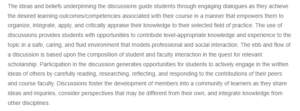Open Forum Discussions
Findings from the web exploration reveal a paradigm shift in health promotion from the healthcare system to individuals and communities. In the article “Beyond Health Care: The Role of Social Determinants in Promoting Health and Health Equity,” Artiga & Hinton (2018) explores the role of at-risk populations in disease prevention and health preservation. In addition, Artiga & Hinton (2018) highlight the significance of addressing the social determinants of health as a measure of reducing the traditional health disparities that affect various community groups. Addressing the social determinants of health also promotes the health of community members by providing a framework for developing policies that shape health practices in communities and enhancing access to healthcare.
Further, provisions from this article apply to at-risk populations and propose measures in which health promotion and preservation can be executed (Artiga & Hinton, 2018). Various communities are disproportionately affected by the social determinants of health. Notably, this is due to the traditional disparities that have been experienced by some communities in the United States. Collaborative approaches between communities and the healthcare systems remain a superior intervention for curtailing health threats in various communities (Alderwick et al., 2021). With the cultural diversification paradigm coming into play in community health promotion and preservation, the healthcare system should demonstrate cultural competence in addressing the social determinants of health among culturally diverse communities to optimize the outcomes of their approaches. “AETC-NMC | Self-Assessment” (2022) reiterates the significance of cultural competence in comprehensive care and provides a self-assessment tool for clinicians to assess their awareness and understanding of multicultural care. Most importantly, this tool is aimed at enhancing cultural competency skills and responsiveness to a diverse group of patients.
Do you need help with your assignment ? Get in touch with us our team is ready to help.
References
AETC-NMC | Self-Assessment. Aetcnmc.org. (2022). Retrieved 4 October 2022, from https://www.aetcnmc.org/self-assessment.html.
Alderwick, H., Hutchings, A., Briggs, A., & Mays, N. (2021). The impacts of collaboration between local health care and non-health care organizations and factors shaping how they work: a systematic review of reviews. BMC Public Health, 21(1). https://doi.org/10.1186/s12889-021-10630-1
Artiga, S., & Hinton, E. (2018). Beyond Health Care: The Role of Social Determinants in Promoting Health and Health Equity. KFF. Retrieved 4 October 2022, from https://www.kff.org/racial-equity-and-health-policy/issue-brief/beyond-health-care-the-role-of-social-determinants-in-promoting-health-and-health-equity/.
ORDER A PLAGIARISM-FREE PAPER HERE
We’ll write everything from scratch
Question
The ideas and beliefs underpinning the discussions guide students through engaging dialogues as they achieve the desired learning outcomes/competencies associated with their course in a manner that empowers them to organize, integrate, apply, and critically appraise their knowledge to their selected field of practice. The use of discussions provides students with opportunities to contribute level-appropriate knowledge and experience to the topic in a safe, caring, and fluid environment that models professional and social interaction. The ebb and flow of a discussion is based upon the composition of student and faculty interaction in the quest for relevant scholarship. Participation in the discussion generates opportunities for students to actively engage in the written ideas of others by carefully reading, researching, reflecting, and responding to the contributions of their peers and course faculty. Discussions foster the development of members into a community of learners as they share ideas and inquiries, consider perspectives that may be different from their own, and integrate knowledge from other disciplines.

Open Forum Discussions
Course Outcomes
CO#6 – Identify important sources of epidemiological data. (PO 2)
Due Date
All postings to the Open Forum are due by Sunday, 11:59 p.m. MT.
Total Points Possible: Complete/Incomplete
Preparing the Assignment
All students are required to make one post. You are not required to provide reply posts.
You can use this time to have a non-structured conversation from the Podcast and website links below. Provide one fact or element from the website exploration that applies to this module’s topic of populations as risk. Everyone should review the AETCMC Self-Assessment link. Please be sure to provide a reference for all sources cited within your post.
Podcast
Kaiser: Beyond Health Care: The Role of Social Determinants in Promoting Health and Health Equity.Links to an external site.
Web Site Links:
Important self-assessment: Self-assessment (culture and attitudes)Links to an external site.
National CLAS StandardsLinks to an external site.
New CLAS Report and Toolkit from OMHLinks to an external site.
National LGBT Health Education CenterLinks to an external site.

